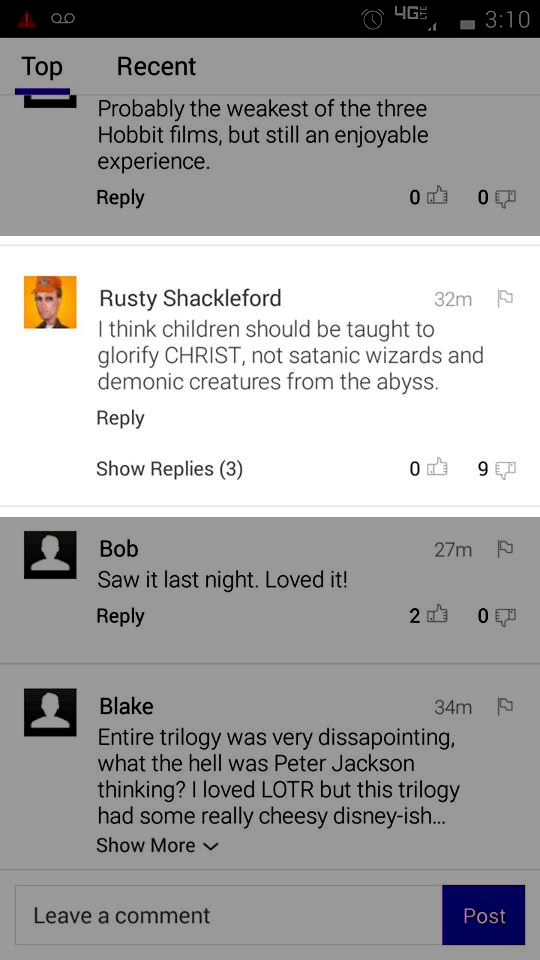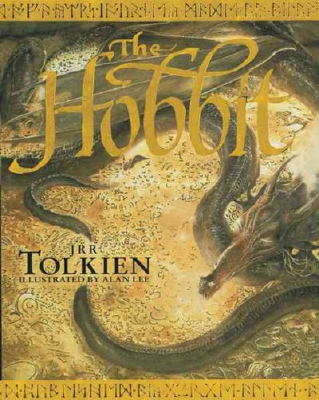‘Glorify Christ, Not Satanic Wizards’?
Brace yourselves: someone on the internet is not only wrong, but doesn’t understand The Hobbit.
A chap called Rusty Shackleford remarks:
I think children should be taught to glorify CHRIST, not satanic wizards and demonic creatures from the abyss.
I don’t know Rusty Shackleford, but Rusty also doesn’t know The Hobbit. Nor does he know the reasons why fans love this and other fantastical stories (whether or how they embrace the recently concluded film trilogy is another issue).
I think whenever Christians who love fantastical stories see examples of ignorance, they should point them out with love yet firmness. This seems in obedience of Rom. 14:16, which states:
So do not let what you regard as good be spoken of as evil.
Rom. 14:161
 My first thought for Rusty and folks like him is that “children should be taught to glorify CHRIST, and not an internet comment.” This flushes out the absurdity of claiming that The Hobbit story (book, film, etc.) must automatically be pitted against Jesus Christ. No Christian believes this about any good gift of God’s (by way of human creativity or otherwise). It’s nonsensical to assert special pleading that only certain unfamiliar things are automatic glory-stealers, instead of being ways we can give glory to the God who gives us our world and storytellers and His own true Story.
My first thought for Rusty and folks like him is that “children should be taught to glorify CHRIST, and not an internet comment.” This flushes out the absurdity of claiming that The Hobbit story (book, film, etc.) must automatically be pitted against Jesus Christ. No Christian believes this about any good gift of God’s (by way of human creativity or otherwise). It’s nonsensical to assert special pleading that only certain unfamiliar things are automatic glory-stealers, instead of being ways we can give glory to the God who gives us our world and storytellers and His own true Story.
My second thought for Rusty and folks like him is that it is dishonest or at best ignorant to claim The Hobbit has “satanic wizards.” Either defend that claim, or else presume that all Christians who disagree are lying to themselves and to you. Such uncharitable presumptions are really often the actual roots from which such accusations spring.
My third thought for Rusty and folks like him is that no one — except perhaps for some nuts — shows up to The Hobbit or Middle-earth film or most other films expecting to cheer on “demonic creatures from the abyss.” Even pagans recognize that a story’s good guys are meant to be good, and bad guys are bad. (That’s why films have visual “cheat codes,” with some unfortunate side effects, that beautiful things are good and ugly things are bad.) So this accusation business that Hobbit fans support the actions of goblins, orcs, dark lords, or sinful Dwarves are nonsense.
 My fourth and final(?) thought for Rusty and folks like him is that no faithful Christian who seeks to obey Scripture will make judgements based only on appearance. This is not even close to biblical discernment. It is a discernment-imposter, a respect for one’s own feelings and emotions rather than for truth informed by careful study of our self-revealing God.
My fourth and final(?) thought for Rusty and folks like him is that no faithful Christian who seeks to obey Scripture will make judgements based only on appearance. This is not even close to biblical discernment. It is a discernment-imposter, a respect for one’s own feelings and emotions rather than for truth informed by careful study of our self-revealing God.
By the way, this God, Jesus Christ, came to earth with “no form or majesty that we should look at him, and no beauty that we should desire him” (Isaiah 53:2). And rather it is Christ’s enemy Satan, and Satan’s servants, who are adept at disguising themselves as an “angel of light” (2 Cor. 11:14). Appearance-based discernment would be worthless in this case to discern what reflects God’s beauty/goodness/truth and what reflects Satan’s ugliness/badness/lies.
So let us reject such “discernments” as a false wisdom of man, not of God. And let us reject such impulsive, uncharitable, and ultimately biblically baseless attempts speak evil of Christians who regard as good certain stories and songs and want to receive them with thanksgiving to God (1 Tim. 4:1-5).
For a far more biblically thoughtful overview of The Hobbit‘s themes, see David Mathis’s article Bilbo’s Last Goodbye at Desiring God Ministries.
How do you respond when you hear other Christians speaking evil about what stories you regard as good?
- Rom. 14 is written to a local church with God-given wisdom that applies to all local churches. Yet broader principles could also apply to the greater community of Christians even on the internet. Furthermore, Paul encourages believers who enjoy certain things to show love for spiritual family who cannot do this without being tempted to their personal sins. If this was “Rusty’s” issue, that The Hobbit was making him personally tempted to sin, then this response would be very different and more sensitive. ↩





























I don’t know if I would have your kindness. Certain folks among the Fundie-Wondie brigades are really annoying me lately. Then again maybe I would. I hope I would.
Well if they annoy you, you can always stop reading their material. If you wish to spite them, that is a better (and pleasanter) method and if you wish to reason with them, calling them the “fundie-wondie brigade” is a bad idea.
Ugh. That is just disgusting that someone would even have that perspective.